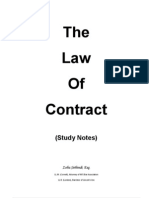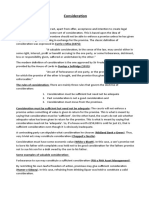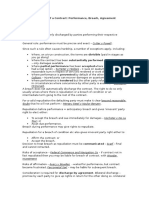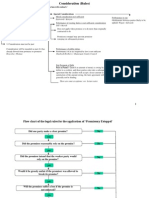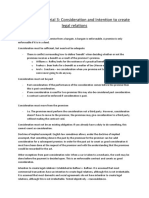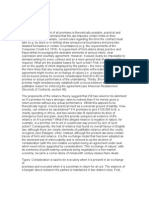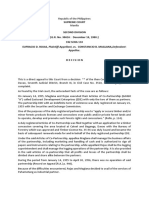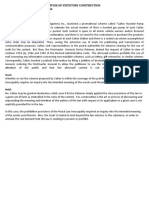Consideration Consideration: Contract Law (University of London) Contract Law (University of London)
Consideration Consideration: Contract Law (University of London) Contract Law (University of London)
Uploaded by
HassamCopyright:
Available Formats
Consideration Consideration: Contract Law (University of London) Contract Law (University of London)
Consideration Consideration: Contract Law (University of London) Contract Law (University of London)
Uploaded by
HassamOriginal Title
Copyright
Available Formats
Share this document
Did you find this document useful?
Is this content inappropriate?
Copyright:
Available Formats
Consideration Consideration: Contract Law (University of London) Contract Law (University of London)
Consideration Consideration: Contract Law (University of London) Contract Law (University of London)
Uploaded by
HassamCopyright:
Available Formats
lOMoARcPSD|4054255
Consideration
Contract law (University of London)
StuDocu is not sponsored or endorsed by any college or university
Downloaded by hassam bugti (hassambugti26@gmail.com)
lOMoARcPSD|4054255
Consideration
As defined in Currie v Misa, consideration must consist in either some right, interest, profit, or
benefit accruing to one party, or some forbearance, detriment, loss or responsibility given,
suffered, or undertaken by the other.
A promise to make a gift will not be legally binding, but the presence of consideration that
makes a promise binding as a contract.
Consideration is known as the badge of enforceability in agreements. There are two types of
consideration – executed (already performed) and executory (yet to be performed)
consideration.
In a wholly executory contract, making of a promise by both parties can be considered as
consideration (Dunlop Pneumatic Tyre v Selfridge). It is better to consider mutuality.
Consideration must move from the promisee:
From Bolton v Madden and Tweddle v Atkinson, it is established that consideration must move
from the promise but not necessarily to the promisor.
Exception: In Williams v Roffey Bros, consideration moved from the promisor. Colman J
expressed his doubt on the correctness of this case in SCT v Trafigura Beeher BV.
Consideration must be sufficient, need not be adequate:
a) Courts will not look into the adequacy of the contract but rather if there is sufficient
consideration (Thomas v Thomas).
b) Courts will not involve themselves in whether the parties got into a bad bargain – parties can
choose what consideration they deem fit, it just has to have some (economic) value in the
eyes of the law (Chappel v Nestle).
c) Consideration must not usually be intangible (White v Bluett).
d) If the consideration is intangible, it should be of some economic value (Bainbridge v
Firmstone, Edmonds v Lawson).
e) Compromise and forbearance to sue is good consideration (Alliance Bank v Broom).
Existing Obligations as Good Consideration
Obligations arising under the law, independent of any contract
Public Duty
- Performance of duty imposed by law cannot be good consideration (Collins v Godefroy,
Leeds United FC v Chief Constable of West Yorkshire).
- If the performance done is more than that required by the existing duty, then the promise
to be paid can be enforced (Glassbrook Bros Ltd v Glamorgan CC).
Legal Duty
- Existing legal duty can be held to be good consideration (Ward v Byham).
Downloaded by hassam bugti (hassambugti26@gmail.com)
lOMoARcPSD|4054255
Obligations owed under a contract with the contracting parties
- Performance of existing contractual duty with the contracting party cannot be good
consideration (Stilk v Myrick).
- Exception: where the performance is over and beyond the existing contractual duty, it can
amount to good consideration (Hartley v Ponsonby).
- Exception: Rule does not apply where promisor gains a practical benefit (Williams v Roffey
Bros). The distinction between this case and Stilk v Myrick is that no pressure was put on
Roffey Bros to make the additional payment, they themselves did to avoid an overall loss.
The rules of practical benefit set up from Williams v Roffey Bros B are as follows:
1) The contract was for supply of goods or service.
2) A was unable to perform as promised (can include economic duress).
3) B agreed to pay more.
4) B obtained a practical benefit.
5) There was not any fraud or duress.
6) If all of the above are satisfied, then consideration is found.
Obligations owed under a contract with third party
- Existing obligations owed to a third party can be considered as good consideration for a fresh
promise (Shadwell v Shadwell, The Eurymedon). This is later confirmed in Pao On.
Part Payment of Debt
- Part payment of debt cannot be good consideration for a promise to not sue for the remaining
amount (Pinnel’s Case). However, if something else (not monetary) is given as agreed by the
promisor besides the part payment, it could amount to good consideration for forbearing to
sue.
- This is affirmed in Foakes v Beer and Re Selectmove.
- Exception: If there is a different contract in order to forbear suing, part payment will be good
consideration (Hirachand Punamchand v Temple).
- Exception: Part payment can be good consideration if there is a practical benefit (MWB
Business Exchange Ltd v Rock Advertising Ltd).
Past Consideration
- Generally, past consideration is not good consideration (Re McArdle, Roscorla v Thomas).
- Exception: It will be good consideration if the 3 stage test set in Pao On is fulfilled:
a) The act/service was done at the promisor’s request (Lampleigh v Braithwaite).
b) An implication of the act being paid for later by either money or some benefit (Lampleigh v
Braithwaite, Re Casey’s Patents). An objective approach taken to determine this step.
c) The promise would have been enforceable had it been made prior to the acts of
consideration.
Downloaded by hassam bugti (hassambugti26@gmail.com)
lOMoARcPSD|4054255
Promissory Estoppel
Promissory estoppel allows for, in certain circumstances, promises to accept a modified
performance of a contract to be binding despite the absence of consideration.
Established in Hughes v Metropolitan Railways, widely developed in Central London Property
Trust Ltd v High Trees House Ltd.
Arden LJ, in Collier commended the development of the law by Denning J in High Trees as
‘brilliant’.
Clearly defined limits summarized by Kitchin LJ in MWB Business Exchange Ltd.
The five elements of promissory estoppel are:
1. Presence of a clear and unequivocal promise that the promisor will not insist on his strict
legal rights against the promisee. It maybe express (High Trees) or by conduct (Hughes).
In cases where the statements considered as a basis to establish a promissory estoppel is
vague, clarification must be sought (Kim v Chasewood Park Residents).
2. Need for reliance on the promise by the promisee (High Trees). This reliance need not be
detrimental, just relying on the promise will suffice (Alan v El Nasr).
3. It would be inequitable for the promisor to go back on his word (D & C Builders v Rees).
However, it would not be inequitable if the promise was withdrawn so quickly that it did not
result in a detriment suffered by the promise by relying on it. (The Post Chaser).
4. It can be used as a shield rather than a sword. Lord Denning, in Combe v Combe held that
promissory estoppel cannot be used as a basis for course of action.
5. It is generally suspensory. After a certain period of time, after the special circumstances have
passed, the original terms of the contract can be continued (High Trees). The promisor can
also give reasonable notice terminating or withdrawing the promise (Tool Metal
Manufacturing Co Ltd v Tungsten Electric Co Ltd).
Downloaded by hassam bugti (hassambugti26@gmail.com)
You might also like
- Admin Ultimate Cheat SheetDocument11 pagesAdmin Ultimate Cheat SheetJoseph0% (1)
- Barnhizer Contractsi 1Document12 pagesBarnhizer Contractsi 1piddes1234No ratings yet
- Contract LawDocument32 pagesContract LawPreeti Joshi Sachdeva100% (1)
- S2 Homicide Act 1957 S.52 Coroners and Justice Act 2009Document2 pagesS2 Homicide Act 1957 S.52 Coroners and Justice Act 2009HassamNo ratings yet
- Effects of Corporate Restructuring, Acquisitions and Merg On An Orginisation (Rutheran)Document38 pagesEffects of Corporate Restructuring, Acquisitions and Merg On An Orginisation (Rutheran)Atan MustaffaNo ratings yet
- Consideration. Version 2022 23Document8 pagesConsideration. Version 2022 23sakiburrohman11No ratings yet
- Consideration: The Rules of Consideration: There Are Mainly Three Rules That Govern The Doctrine ofDocument4 pagesConsideration: The Rules of Consideration: There Are Mainly Three Rules That Govern The Doctrine ofMehedi Hasan ShaikotNo ratings yet
- Contract Law 2 Short NotesDocument9 pagesContract Law 2 Short NotesWaseem Ahmad QurashiNo ratings yet
- Consideration & Promissory EstoppelDocument6 pagesConsideration & Promissory EstoppelSultan Mughal100% (1)
- Reciprocal PromiseDocument5 pagesReciprocal PromiseBoobalan R100% (1)
- Contract Law AssignmentDocument10 pagesContract Law AssignmentSyed Muhammad Ahmed100% (1)
- Blaw Week 3 - ConsiderationDocument4 pagesBlaw Week 3 - ConsiderationKenny Ong Kai NengNo ratings yet
- Unit 3Document28 pagesUnit 3ratna supriyaNo ratings yet
- Consideration Summary NotesDocument11 pagesConsideration Summary NotesBrian PetersNo ratings yet
- Lecture 14Document7 pagesLecture 14Amelia WongNo ratings yet
- Contract Law Week 3Document6 pagesContract Law Week 3sansarsainiNo ratings yet
- Adrian Fall 1L - Contracts Final OutlineDocument63 pagesAdrian Fall 1L - Contracts Final OutlineJasmine GaoNo ratings yet
- Conbsideration PresentationDocument11 pagesConbsideration PresentationJaseme OtoyoNo ratings yet
- Doctrine of Privity of ContractDocument7 pagesDoctrine of Privity of ContractNanasaheb MarkadNo ratings yet
- Consideration ExamDocument7 pagesConsideration ExamBarrister Rabbiul Alam RafiNo ratings yet
- ConsiderationDocument2 pagesConsiderationZuhair HasanNo ratings yet
- Business Law NotesDocument13 pagesBusiness Law NotesToni MiharjaNo ratings yet
- Promise: Pharmaceutical Society of Great Britain V Boots Cash Chemists (Southern) LTDDocument21 pagesPromise: Pharmaceutical Society of Great Britain V Boots Cash Chemists (Southern) LTDOlayinka OlanrewajuNo ratings yet
- Notes - A Level LawDocument22 pagesNotes - A Level LawMohammad Abdullah KhanNo ratings yet
- Contract Law (Remedies Exam)Document4 pagesContract Law (Remedies Exam)Mahdi Bin MamunNo ratings yet
- Revision Notes Notes-Contractlaw PDFDocument32 pagesRevision Notes Notes-Contractlaw PDFshoaibmirza1No ratings yet
- ConsiderationDocument3 pagesConsiderationAgnes LimNo ratings yet
- Contract PaperDocument3 pagesContract PaperHaseebullah KhanNo ratings yet
- MNG 4104 - Lecture Notes Week 2 - ConsiderationDocument24 pagesMNG 4104 - Lecture Notes Week 2 - ConsiderationJoshua GafoorNo ratings yet
- Contract Law - Unit 9 - Student GuideDocument8 pagesContract Law - Unit 9 - Student GuideBilal AliNo ratings yet
- Chapter 3 Business LawDocument8 pagesChapter 3 Business Law25gqxnpvngNo ratings yet
- 04 Privity of ContractDocument5 pages04 Privity of ContractMustafa JaowadNo ratings yet
- Discharge of A Contract: Performance, Breach, AgreementDocument3 pagesDischarge of A Contract: Performance, Breach, AgreementTheDude9999No ratings yet
- Law CharlieDocument3 pagesLaw CharlieAndrea Alejandra Ortega NavarroNo ratings yet
- Contract LawDocument13 pagesContract LawnwanabossNo ratings yet
- Remedies in Contract LawDocument11 pagesRemedies in Contract LawjaybotommyNo ratings yet
- 2 - Formation and VariationDocument16 pages2 - Formation and Variationsksoor1No ratings yet
- Law of ContractDocument18 pagesLaw of ContractPeteroNo ratings yet
- Case BriefsDocument40 pagesCase BriefsBenjamin Ballard100% (1)
- Contracts Bare Bones FlowDocument4 pagesContracts Bare Bones FlowKirstenP14No ratings yet
- Consideration - SUM Consideration - SUM: Contract Law (University of London) Contract Law (University of London)Document5 pagesConsideration - SUM Consideration - SUM: Contract Law (University of London) Contract Law (University of London)HassamNo ratings yet
- 7 C0nsideration PDFDocument6 pages7 C0nsideration PDFForbes TonsaNo ratings yet
- Flowchart - Lecture 4Document2 pagesFlowchart - Lecture 4Mandy DuNo ratings yet
- Consideration Mugger NotesDocument14 pagesConsideration Mugger NotesDonald TayNo ratings yet
- Lect. 2.3 ConsiderationDocument14 pagesLect. 2.3 ConsiderationAudrey RolandNo ratings yet
- Chapter 10: Offer and Revocation: Assent (Cont )Document7 pagesChapter 10: Offer and Revocation: Assent (Cont )Lidice Ferrera PorroNo ratings yet
- Discharge of ContractDocument17 pagesDischarge of ContractPavithra JNo ratings yet
- No 15 ConsiderationDocument13 pagesNo 15 ConsiderationRANDAN SADIQNo ratings yet
- ConsiderationDocument4 pagesConsiderationHira AliNo ratings yet
- Consideration 2Document8 pagesConsideration 2aniruddhosarker04No ratings yet
- Tutorial 3 Notes - Consideration and Intention To Create Legal RelationsDocument3 pagesTutorial 3 Notes - Consideration and Intention To Create Legal RelationsAdam 'Fez' Ferris100% (2)
- LAW202 - Law of Contract: Consideration Session 3 ©NU 2020Document40 pagesLAW202 - Law of Contract: Consideration Session 3 ©NU 2020Hênry Stanley NkhuwaNo ratings yet
- NeelamtilluckDocument10 pagesNeelamtilluckNeelam TilluckNo ratings yet
- Consider Tai OnDocument1 pageConsider Tai OnLee Ka FaiNo ratings yet
- ConsiderationDocument54 pagesConsiderationBrandon WongNo ratings yet
- Breach of Contact DoxDocument7 pagesBreach of Contact Doxrutendo budaiNo ratings yet
- ContractsDocument27 pagesContractsJerry LeuNo ratings yet
- Contract Law - The Performance of An Existing Duty Amounts To Valid Consideration To Enable Enforcement of A PromiseDocument2 pagesContract Law - The Performance of An Existing Duty Amounts To Valid Consideration To Enable Enforcement of A PromiseSultan MughalNo ratings yet
- Life, Accident and Health Insurance in the United StatesFrom EverandLife, Accident and Health Insurance in the United StatesRating: 5 out of 5 stars5/5 (1)
- Understanding Commercial Real Estate Contracts: Commercial Real Estate Transactions Guide, #2From EverandUnderstanding Commercial Real Estate Contracts: Commercial Real Estate Transactions Guide, #2No ratings yet
- Consideration Notesconsideration Consideration NotesconsiderationDocument4 pagesConsideration Notesconsideration Consideration NotesconsiderationHassamNo ratings yet
- Cases Offer N Acceptance Cases Offer N AcceptanceDocument3 pagesCases Offer N Acceptance Cases Offer N AcceptanceHassamNo ratings yet
- Termination of Offer: Counter Offer Offer LapsesDocument1 pageTermination of Offer: Counter Offer Offer LapsesHassamNo ratings yet
- Chapter One The Concept of ContractDocument1 pageChapter One The Concept of ContractHassamNo ratings yet
- Consideration - SUM Consideration - SUM: Contract Law (University of London) Contract Law (University of London)Document5 pagesConsideration - SUM Consideration - SUM: Contract Law (University of London) Contract Law (University of London)HassamNo ratings yet
- A Codified ConstitutionDocument5 pagesA Codified ConstitutionHassamNo ratings yet
- Programme Information: Validation CodeDocument2 pagesProgramme Information: Validation CodeHassamNo ratings yet
- Termination of An OfferDocument1 pageTermination of An OfferHassamNo ratings yet
- Communication of OffersDocument1 pageCommunication of OffersHassamNo ratings yet
- Agreement Offer and AcceptanceDocument1 pageAgreement Offer and AcceptanceHassamNo ratings yet
- AcceptanceDocument1 pageAcceptanceHassamNo ratings yet
- Acceptance: Silence Ignorance of Offer Tenders Dealing With MachinesDocument1 pageAcceptance: Silence Ignorance of Offer Tenders Dealing With MachinesHassamNo ratings yet
- In The Honourable Court of Appeal of Uk: Michelle Gilrose - AppellantDocument8 pagesIn The Honourable Court of Appeal of Uk: Michelle Gilrose - AppellantHassamNo ratings yet
- Chapter: 1 UK Constitutions and It's Core InstitutionsDocument1 pageChapter: 1 UK Constitutions and It's Core InstitutionsHassamNo ratings yet
- Causation Case List Causation Case List: Criminal Law (University of London) Criminal Law (University of London)Document3 pagesCausation Case List Causation Case List: Criminal Law (University of London) Criminal Law (University of London)HassamNo ratings yet
- Terms of A Contract LectureDocument10 pagesTerms of A Contract LectureHassam100% (1)
- RUle of LawDocument1 pageRUle of LawHassamNo ratings yet
- Michelle V CPS S2 ADocument8 pagesMichelle V CPS S2 AHassamNo ratings yet
- Terms Contract Law Notes With Case LawDocument3 pagesTerms Contract Law Notes With Case LawHassamNo ratings yet
- Prosecution Arguments (2nd Issue)Document2 pagesProsecution Arguments (2nd Issue)HassamNo ratings yet
- Michelle V CPS S2 PDocument9 pagesMichelle V CPS S2 PHassamNo ratings yet
- Cases & Statutes ProsecutionDocument4 pagesCases & Statutes ProsecutionHassamNo ratings yet
- Respondent Arguments (2nd Issue)Document2 pagesRespondent Arguments (2nd Issue)HassamNo ratings yet
- Case NoteDocument5 pagesCase NoteHassam100% (1)
- The Limited Partnership in New York, 1822-1858: Partnerships Without KinshipDocument35 pagesThe Limited Partnership in New York, 1822-1858: Partnerships Without KinshipKi-Ga AlNo ratings yet
- Rule 62-63 Full TextDocument36 pagesRule 62-63 Full TextMJ ApolinarNo ratings yet
- Credit Suisse v. U.S.D.C.Document10 pagesCredit Suisse v. U.S.D.C.alsb2012No ratings yet
- Department of Budget and Management v. Manila's Finest Retirees Association, IncDocument3 pagesDepartment of Budget and Management v. Manila's Finest Retirees Association, IncCJVNo ratings yet
- Making Enterprises Vs Marfori - G.R. No. 152239 August 17, 2011Document6 pagesMaking Enterprises Vs Marfori - G.R. No. 152239 August 17, 2011Ebbe DyNo ratings yet
- A New Lawsuit File Superior Court of San Diego Seeks Damages For Breach of Contract Gildred Et Al - Is Hit by The Bus or A Bicycle, Same ResultsDocument25 pagesA New Lawsuit File Superior Court of San Diego Seeks Damages For Breach of Contract Gildred Et Al - Is Hit by The Bus or A Bicycle, Same ResultsiserviceNo ratings yet
- Rojas V MaglanaDocument7 pagesRojas V MaglanaJustine UyNo ratings yet
- Kashmir Law College: Nowshera Srinagar Assignment File of CPCDocument12 pagesKashmir Law College: Nowshera Srinagar Assignment File of CPCIrfan bhatNo ratings yet
- Doctrine of Primary JurisdictionDocument19 pagesDoctrine of Primary JurisdictionAlyssa Clarizze MalaluanNo ratings yet
- Digests StatconDocument48 pagesDigests StatconJhå Tölôsá Sêrāpïón100% (1)
- 2018.12.28. Answer To CounterclaimDocument3 pages2018.12.28. Answer To CounterclaimdoczharNo ratings yet
- Ponce Vs EncarnacionDocument1 pagePonce Vs EncarnacionHariette Kim TiongsonNo ratings yet
- Banking and Allied Laws - Atty IgnacioDocument23 pagesBanking and Allied Laws - Atty IgnacioAngela B. Lumabas0% (1)
- Pure Economic Loss & Negligent Misstatements in United Kingdom and Malaysia 2Document24 pagesPure Economic Loss & Negligent Misstatements in United Kingdom and Malaysia 2Imran ShahNo ratings yet
- Solidum Aldaba PDFDocument1 pageSolidum Aldaba PDFjuan aldabaNo ratings yet
- Lecture-2 Principles of InsuranceDocument24 pagesLecture-2 Principles of InsuranceadilahtabassumNo ratings yet
- Condonation DoctrineDocument4 pagesCondonation DoctrineRhona CacanindinNo ratings yet
- Persons: Marriage (Family Code)Document21 pagesPersons: Marriage (Family Code)Gretel R. MadanguitNo ratings yet
- Navarra V People DigestDocument3 pagesNavarra V People DigestRoyen Lacson De MesaNo ratings yet
- Development Agreement Between Rosenberg Land Holdings and Fort Bend CountyDocument35 pagesDevelopment Agreement Between Rosenberg Land Holdings and Fort Bend CountydugbegleyNo ratings yet
- Contract Law: For Other Uses, SeeDocument25 pagesContract Law: For Other Uses, SeeJasonry BolongaitaNo ratings yet
- Vaarivana Mini Brochure PDFDocument5 pagesVaarivana Mini Brochure PDFVinayak NavaleNo ratings yet
- Prosecution Under Income Tax PDFDocument41 pagesProsecution Under Income Tax PDFLalit Tambi0% (1)
- Law 351 Lifting The VeilDocument20 pagesLaw 351 Lifting The VeilnathanNo ratings yet
- Republic vs. ParanaqueDocument7 pagesRepublic vs. ParanaqueMj BrionesNo ratings yet
- Syllabus 3Document47 pagesSyllabus 3ErinNo ratings yet
- Apartment Lease Agreement: Property FOPDocument14 pagesApartment Lease Agreement: Property FOPSalaam Bey®No ratings yet
- Summary of RulingsDocument12 pagesSummary of RulingsRabindranathNo ratings yet



